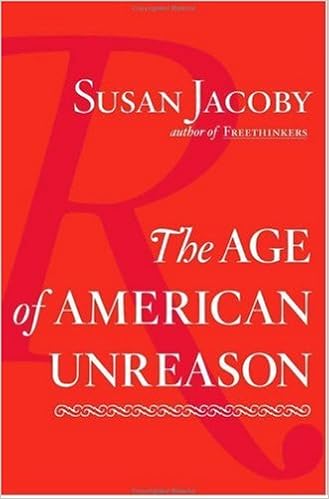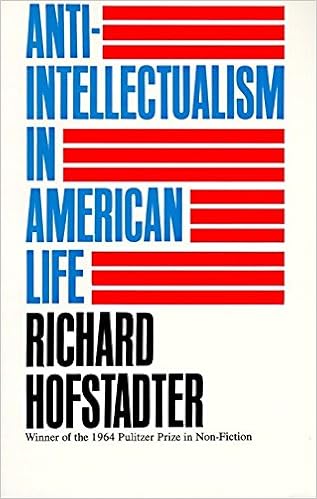 In 2004 Susan Jacoby published her book, Freethinkers, and then set out on a promotion tour. Later, when speaking of that tour she told of an interesting and important discovery... those who came to listen to her speak already agreed with the premise of the book. There was no one at any of the stops to offer dissent. It was as if those in who might be in disagreement did not care to expose themselves to viewpoints contrary to their closely held beliefs. As a result, four years later Jacoby published her next book, The Age of American Unreason.
In 2004 Susan Jacoby published her book, Freethinkers, and then set out on a promotion tour. Later, when speaking of that tour she told of an interesting and important discovery... those who came to listen to her speak already agreed with the premise of the book. There was no one at any of the stops to offer dissent. It was as if those in who might be in disagreement did not care to expose themselves to viewpoints contrary to their closely held beliefs. As a result, four years later Jacoby published her next book, The Age of American Unreason.
In that book, Jacoby observes that religious extremism and political opportunism have taken over our culture, and the means by which they have done it is by mass marketing and constant repetition of falsehood. The book is almost a sequel to Hofstadter's landmark work, Anti-intellectualism in American Life. This 1963 book was his dissection of the American mindset he had observed leading up to the 1960 election, the anti-JFK tribalism, and the segregationist attitudes so prevalent at the time.
 In her book, Jacoby writes that "the scales of American history have shifted heavily against [the] intellectual life so essential to functional democracy." When asked, she called herself a “cultural conservative,” but lamented that the term had been "hijacked by the religious right," which she describes as "preoccupied with […] the preservation of the phrase 'under God' in the Pledge of Allegiance." Throughout the book, Jacoby builds the argument that America is damaged not only by the resulting mass ignorance, but by the pride taken in that ignorance, and of the arrogance of the ignorant individuals who practically relish their know-nothingness. (“… I love the poorly educated.”)
In her book, Jacoby writes that "the scales of American history have shifted heavily against [the] intellectual life so essential to functional democracy." When asked, she called herself a “cultural conservative,” but lamented that the term had been "hijacked by the religious right," which she describes as "preoccupied with […] the preservation of the phrase 'under God' in the Pledge of Allegiance." Throughout the book, Jacoby builds the argument that America is damaged not only by the resulting mass ignorance, but by the pride taken in that ignorance, and of the arrogance of the ignorant individuals who practically relish their know-nothingness. (“… I love the poorly educated.”) 
Ignorance is served to us daily; here in the blogosphere, on Facebook and other forms of social media, in the nightly news, the pathetic game shows and soap operas, “reality” TV programs, and every time a politician, pundit, or preacher opens a mouth.
But there is a difference between mundane and virulent ignorance.
Mundane ignorance is when the on-street interviewer asks a dozen passersby to point out Idaho on a map... or name the freedoms enshrined in the 1st amendment. Virulent ignorance is evident in people who claim to be educated and call themselves “stable genius.” They believe that they are informed on important subjects when in reality they’ve just been educated into greater ignorance.
These are the people who do not show up to speak with Susan Jacoby, because they are already convinced that she is wrong. They are the people who watch only Fox, or only MSNBC for their news. They are the ones constantly parroting "fake news." They are willing to swallow falsehood so long as it agrees with what they want to believe... and they are immune to actual evidence.
~~~












